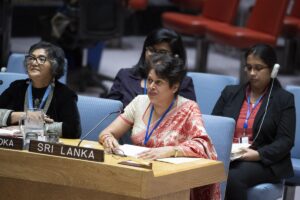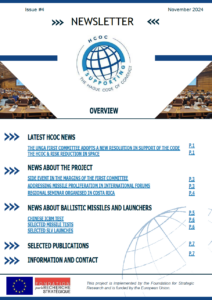EVOLUTION OF THE DRIVERS FOR BALLISTIC MISSILE ACQUISITION
4 June 2025
Vienna
On 4 June 2025, the FRS organised a side event in the margins of the HCoC Annual Regular Meeting.
AGENDA
In many regions, a number of countries are currently developing or acquiring ballistic missiles. In addition to geopolitical factors, technological developments are modifying the role of ballistic missiles in military strategy: on the one hand, they are increasingly precise and some have the ability to aim very specific targets, on the other hand, the generalisation of missile defence means that relatively simple short-range systems can lose their relevance.
This side event assessed the drivers of ballistic missile proliferation and explore the role of arms control and confidence building measures in the current context.


Introduction
Mr Stefan Tressing, Deputy Head of Division, Disarmament, Non-Proliferation and Arms Export Control, European External Action Service (EEAS), European Union
Amb. Alex Wetzig Abdale, Ambassador and Permanent Representative of Chile to the International Organisations in Vienna, HCoC Chair 2024-2025
Amb. Alejando Garofali Acosta, Ambassador and Permanent Representative of Uruguay to the International Organisations in Vienna, HCoC Chair 2025-2026
Main session: Evolution of the Drivers for Ballistic Missile Acquisition
MODERATOR:
- Mr Alexandre Houdayer, Secretary General, FRS
PANELLISTS:
Prof. Sitki Egeli, Associate Professor, Izmir University of Economics
Dr Polina Sinovets, Head of Odessa Center for Nonproliferation
Dr Javed Alam, Research Associate, Centre for Air Power Studies, HCoC Youth Group
Ms Eva-Nour Repussard, Policy Fellow at BASIC, HCoC Youth Group
Ms Emmanuelle Maitre, Senior Research Fellow, FRS


